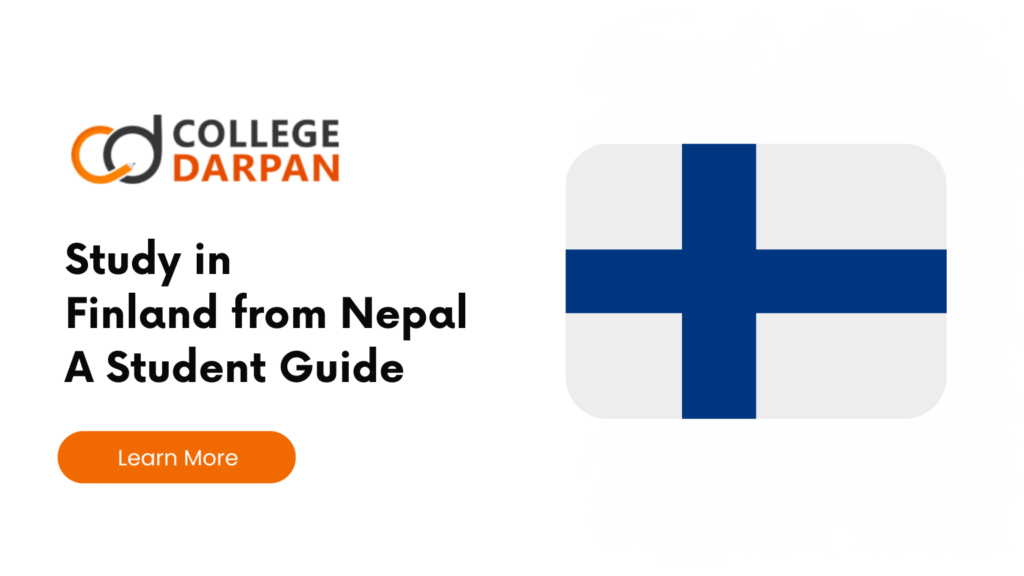Finland, known for its beautiful natural landscapes, innovative spirit, and excellent education system, is a fantastic place for Nepalese students looking for a unique academic experience. This guide will help you understand Finland’s education system, the application process, and what life is like as a student in this amazing country.
Why Study in Finland?
Academic Excellence
Top-Ranked Universities: Finnish universities are globally recognized for their quality. According to the QS World University Rankings 2024, the University of Helsinki ranks among the top 100 universities worldwide.
Focus on Innovation and Research: Finland’s universities are known for their strong emphasis on research and innovation. Finland ranks 7th globally in the Global Innovation Index 2023, highlighting its commitment to cutting-edge research and practical applications of knowledge. You’ll develop critical thinking skills and the ability to solve real-world problems.
Program Variety: You can choose from a wide range of programs, from technology and engineering to social sciences and arts. For instance, Aalto University offers over 80 master’s programs across various fields.
English-Taught Programs: Many programs are available in English, so you won’t need to learn Finnish to study your favorite subjects. In 2022, there were over 400 English-taught degree programs available in Finnish higher education institutions.
Benefits Beyond Academics
Thriving International Community: Finland welcomes international students, providing opportunities to make friends from all over the world and learn about different cultures. In 2022, there were over 20,000 international students in Finland.
High Quality of Life: Known as one of the happiest countries, Finland offers excellent healthcare, safety, stunning natural beauty, and a healthy work-life balance. According to the World Happiness Report 2023, Finland ranked as the happiest country for the sixth consecutive year.
Post-Graduation Opportunities: A Finnish degree can give you a competitive edge in the global job market, and Finland offers post-study work visa options to help you gain professional experience. According to a survey by the Finnish National Agency for Education, 55% of international graduates find employment in Finland after completing their studies.
The Finnish Education System
Understanding the education system will help you navigate your academic journey:
- Basic Education: Compulsory for children aged 7-16, focusing on core subjects, social skills, and independent learning. Finland has one of the highest literacy rates in the world, at 99%.
- Upper Secondary Education: Divided into general education (lukio) and vocational training (ammatti). The Finnish Matriculation Examination, taken at the end of upper secondary education, is required for university admissions.
- Higher Education: Universities and Universities of Applied Sciences offer bachelor’s (3-4 years), master’s, and Ph.D. degrees. As of 2023, there are 13 universities and 23 universities of applied sciences in Finland.
Securing Your Student Visa
To study in Finland, you’ll need a student visa. Here’s how to get it:
- Gain Acceptance: Apply to and get accepted by a recognized Finnish university. They’ll issue a letter of acceptance.
- Visa Application: Visit the Finnish Immigration Service website (https://migri.fi/en/home) for the latest visa application procedures. Submit your application with your acceptance letter, proof of financial support, health insurance, and English language proficiency test results (if required).
- Interview: You might need to attend an interview at the Finnish embassy or consulate in Nepal.
Cost Considerations
Tuition Fees: Public universities charge tuition fees for non-EU/EEA students, including Nepalese students. Fees vary depending on the program and study level. Here’s a general idea:
| Level of Study | Average Annual Tuition Fees (EUR) | Estimated Monthly Living Expenses (EUR) |
|---|---|---|
| Undergraduate | €6,000 – €18,000 | €700 – €1,000 |
| Postgraduate | Varies | €700 – €1,000 |
Scholarships: Look for scholarships to help with costs. Universities, the Finnish government, and external organizations offer scholarships for international students. For example, the Finnish government offers the Finland Scholarship for non-EU/EEA students, covering tuition fees and living expenses.
Top Universities in Finland
Some of Finland’s renowned universities are:
- University of Helsinki: Ranked 92nd in the QS World University Rankings 2024, known for its excellence in medicine, humanities, and social sciences.
- Aalto University: Ranked 112th in the QS World University Rankings 2024, specializes in engineering, science, business, and arts.
- University of Turku: Ranked among the top 300 universities globally, focuses on medicine, social sciences, humanities, and natural sciences.
- Tampere University: Known for its strengths in engineering, IT, and social sciences, and is highly regarded in research-intensive fields.
- University of Jyväskylä: Excels in education, sports sciences, and humanities, and is known for its strong research output.
Best Cities to Study in Finland
- Helsinki: The vibrant capital with a bustling student life and easy access to the sea. Home to the University of Helsinki and Aalto University’s main campus.
- Espoo: Home to Aalto University, offering a modern atmosphere and lots of green spaces. Espoo is the second-largest city in Finland and part of the Helsinki metropolitan area.
- Turku: Finland’s oldest city with a rich history and lively cultural scene. Home to the University of Turku and Åbo Akademi University.
- Tampere: Known for its lakeside setting and strong focus on technology and innovation. Tampere University is located here, known for its engineering and IT programs.
- Jyväskylä: Surrounded by natural beauty, with a friendly student community. Home to the University of Jyväskylä, renowned for its education and sports sciences programs.
Popular Courses in Finland
Here are some popular fields of study:
- Information and Communication Technology (ICT): With over 20,000 IT-related job openings annually, Finland is a hub for ICT education.
- Business Administration & Management: Business schools in Finland rank highly, with Aalto University’s business school in the top 100 globally.
- Mechanical Engineering & Sustainable Engineering: Finland is known for its engineering programs, with a strong focus on sustainability and innovation.
- Forestry & Environmental Sciences: Finland’s vast forests make it an ideal place to study forestry and environmental sciences.
- Education: Finland’s education system is globally recognized, making it a great place to study education.
- Social Sciences (Psychology, Sociology): Strong programs in social sciences, with a focus on research and practical applications.
- Medicine & Healthcare: Finland has some of the best medical schools in the world, with cutting-edge research and facilities.
- Design (Fashion, Graphic Design): Known for its design heritage, Finland offers top programs in fashion and graphic design.
- Game Design & Development: Finland is home to successful game development companies, making it a great place to study game design.
- Tourism & Hospitality Management: With a strong tourism industry, Finland offers excellent programs in hospitality management.
Understanding Health Insurance in Finland
Public Healthcare: Finland’s public healthcare system provides basic medical coverage for all residents, including international students. You’ll need to register with the local authorities and apply for a Kela card to access these services.
Private Insurance: Consider getting private insurance for broader coverage, including dental care and specialists. This can ensure you’re covered for all medical needs.
Job Opportunities in Finland
Part-time Work Permit: You can work part-time (up to 20 hours per week) during the semester and full-time during breaks with a student visa.
Job Market: Finland has a strong economy with diverse job opportunities, especially in technology, engineering, forestry, and healthcare. Cities like Helsinki, Espoo, and Tampere offer many job opportunities.
Minimum Wage: The national minimum wage is around €10.05 per hour.
University Support: Many universities offer career services, job placement assistance, workshops, resume writing guidance, and interview skills training.
Post-study Work Permit: After graduation, you may be eligible for a temporary residence permit to look for a job and gain valuable work experience in Finland for up to six months.
Frequently Asked Questions (FAQs)
What is the application process for studying in Finland? The process varies by university and program. Generally, you’ll need to apply directly to the university, submit transcripts, proof of English proficiency, and pay application fees.
How long do programs typically last?
- Bachelor’s degrees: 3-4 years
- Master’s degrees: 1-2 years
- Ph.D.s: 3-4 years
Is it necessary to learn Finnish to study in Finland? While many programs are taught in English, learning basic Finnish can help with daily life and social integration.

